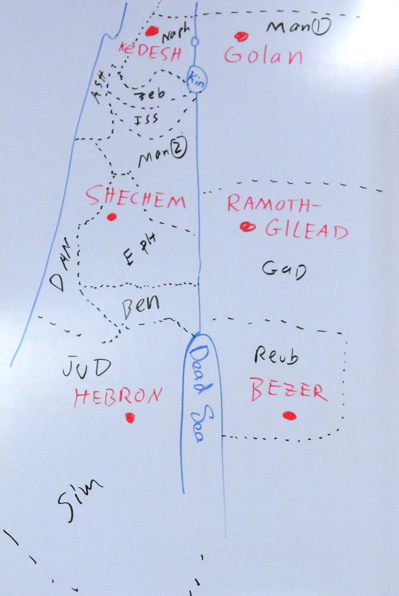Podcast: Play in new window | Download (Duration: 1:05:07 — )
Subscribe: RSS
Reader: Jeff
Teacher: Daniel Agee
Thought questions

Daniel’s map of the Land of Israel with the tribal boundaries and refuge city names in red.
- How did the concept of cities of refuge carry into the Christian church?
- How does the Christian interpretation differ from what is written in the Torah?
- What are some of the similarities of differences in how manslaughter cases were handled then than now?
- How easy was it to get to the refuge cities (see Deuteronomy 19)?
- What two requirements were put on the one suspected of manslaughter to be given sanctuary in a refuge city (see Joshua 20:6)?
- What is the symbolism behind the trial before the assembly and the death of the high priest?
- Who is the "blood avenger" in a manslaughter incident?
- Is the blood avenger following the law, the Torah?
- How does the refuge city protect the accused before the trial?
- How does the death of the high priest protect the accused even more than just being in a refuge city?
- What does the refuge city symbolize?
- Who does King David say is his refuge?
- Does the Year of Jubilee release the manslayer?
- What is the connection between pleading your case at the refuge city and confessing to God?
- What does the death of the high priest symbolize?
- Who is the "blood avenger" in a manslaughter incident?
- What is the responsibility of the people in the suburbs around the city of refuge?
- How does the lesson of the refuge cities relate to apostle Paul’s comments in Colossians 2:13–15 of Messiah Yeshua’s (Jesus) "having cancelled the written code … nailing it to His cross"?
- How unique were refuge cities and judging intent in the ancient world?
- How is intent determined in manslaughter cases in the Torah?
- Why did God wait until the land was divided among the tribes before the Levites were given cities?
- Why did the Levites not get land around Shiloh where the tabernacle was?
- Why did God put them in and around Yerushalayim (Jerusalem)?
- Which two verses aren’t in chapter 21 in the Masoretic text of the Hebrew Bible, which was used for the King James Version?
- Where did the information in verses 35 and 36 come from?
- Why did the big tribes not give many cities to the Levites and the smaller tribes gave more, as required by Moshe’s (Moses) instruction in Numbers 35:8?
- Did Yehoshua (Joshua) break the law by not dividing the cities that way?
- How did fertility of the land factor into this?
- How can it be that "not one of all the LORD’s good promises to the house of Israel failed; every one was fulfilled," as mentioned in verses 41 to 43?
- Does that mean all the promises to Israel are done, as some Christian denominations teach?
- To whom were the promises given?
- Whose forefathers were referred to in the promises in the division of the land?
- What about the promise of territory stretching to the Euphrates River given to Avraham (Abraham)?
- What "rest" is referred to in chapter 22 verse 44?
- Was it truly shalom, or completeness, peace, and well-being?
- Did the tribes stop their battles?
- Was it the time to "beat swords into plowshares," as foretold in Isaiah 2:4?
- Does that mean all the promises to Israel are done, as some Christian denominations teach?